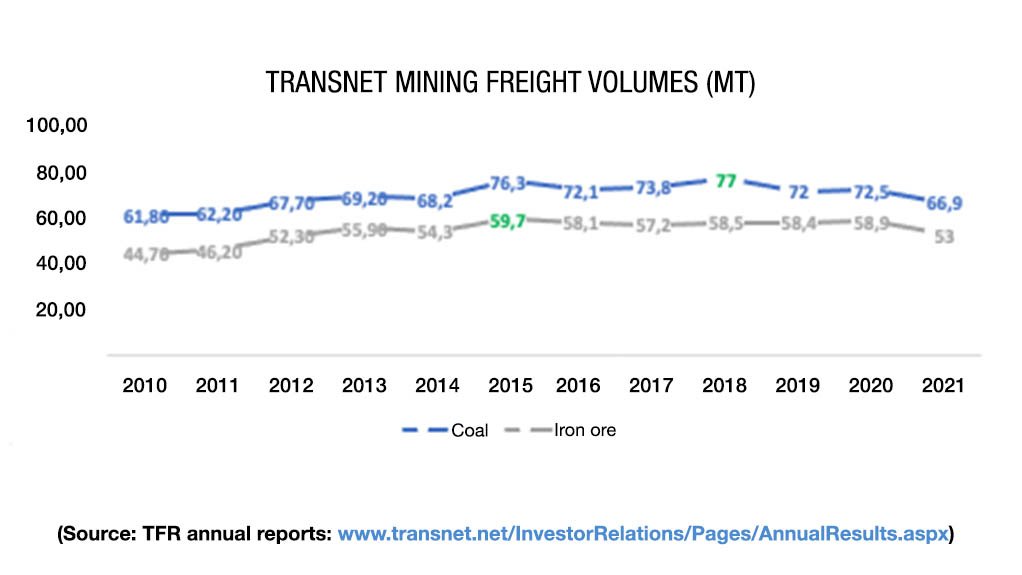JOHANNESBURG (miningweekly.com) – While there is commitment from State rail enterprise Transnet to find a solution to bulk commodity logistical disruption, the issue is time, as the challenges need to be overcome with the necessary speed to avoid South Africa continuing to lose out on decent commodity prices.
“The State’s financial health is directly linked to its own capacity to rail mining products to the ports for exports. It's with this in mind that the logistics problems we're experiencing should not be seen as a specifically mining sector problem. It’s a country problem and everyone must be concerned, policy makers, Transnet leadership as well as the rail customers,” Menar MD Vuslat Bayoglu emphasised during a Zoom interview with Mining Weekly. (Also watch attached Creamer Media video.)
Menar is a private investment company with an actively managed and growing portfolio of mining assets currently made up of anthracite, coal, gold, manganese and nickel and the hand-in-glove position of bulk commodities and logistics has suffered considerable recent disruption in South Africa.
“The problems seem attributable to three sources. Firstly, the legacy of governance problems at Transnet. Secondly, contracting issues with locomotive suppliers and concerns about irregularities, and thirdly the ongoing theft and vandalism of rail infrastructure.
“The consequence is that many miners are sitting with increasing stockpiles at a time when prices are good, when both mining companies and Transnet should be making a killing and the government’s financial position should be healthier,” said Bayoglu, who answered these questions put to him by Mining Weekly:
How have the logistics challenges affected your business in particular?
The delays and, in some instances, insufficient availability of wagons has forced us to take some of our products to the road. Our calculation is that at the current coal prices, it’s affordable to do so, but if the coal prices were to tank significantly, then we’ll have an immediate crisis. Further, taking the product to road is more than twice as expensive as rail – which means we don’t realise the full value of what is otherwise a decent coal price. The fuel price hikes already add to the cost burden of trucking. Trucking is also not healthy for our roads as it increases the wear and tear rate.
Is government in general and Transnet in particular giving the industry a hearing?
I think they have heard industry concerns. The concern has been discussed on various platforms. It came up at the 2022 Mining Indaba. Recently, Transnet convened a meeting with emerging miners where the challenges were discussed. I think there is commitment from Transnet to find a solution. The issue is time. These issues need to be addressed with the necessary speed. If we don’t address them, we will continue to lose out on the decent commodity prices.
Do you think there is a solution in sight?
On the contractual dispute around the procurement of locomotives, Transnet chief executive Portia Derby has spoken about “reverse engineering” to make up for the lack of supply of locomotives parts by the contractor it had contracted. This was done while negotiations are ongoing to resolve the dispute. I believe this needs high-level political intervention by President Cyril Ramaphosa who needs to talk to his Chinese counterpart Xi Jinping. I think it’s not diplomatically sound that a South African State-owned company and a Chinese counterpart can be locked in a dispute that effectively tempers with the logistics of trade between the two countries. China is the biggest importer of our minerals and it has direct interest in the efficiency of our rail system.
On the theft of rail infrastructure, I think the government is slow. Out of frustration about the ongoing theft, I once made a suggestion that is not typical of a businessman – that the government should think about nationalising scrap metal trading and put in place strict enforcement mechanisms. But I heard recently that Trade and Industry Minister Ebrahim Patel is drafting legislation to strengthen regulation of scrap metal trading. It’s long overdue. But the mining industry has availed itself to cooperate with Transnet on initiatives to deal with theft of infrastructure. The spirit of cooperation between Transnet and its customers will be key to the future of the rail infrastructure in the country.
Do you think the mooted plan to allow third-party access to rail will be useful?
Yes, this is very important. We should accept that government and State-owned companies cannot do everything. You need private investors with the capital and the right skills to be given the opportunity to make our rail system to be competitive. Transnet’s decision to unlock opportunities for private sector access to the rail network is a very important step. The Department of Transport and the Department of Public Enterprises recently launched a discussion paper on rail policy. We welcome the policy proposals, particularly its emphasis on giving private sector third-party access to the rail network. We look forward to the implementation of the policy and Transnet should go ahead with its plans.
Are you considering investing in logistics?
Our group has operations that run some rail sidings – mostly in areas close to our mining operations. So, our experience in rail logistics is limited to the operation of sidings. But with the liberalisation of the main rail infrastructure and government’s new policy framework, we are expanding our capacity and we are considering taking advantage of the opportunities that Transnet might make available. We have assembled a team that will evaluate opportunities that might arise.
Would you consider investing in ports as well?
Possibly. We are a shareholder at Richards Bay Coal Terminal and where there is an opportunity to support government’s logistics capabilities in a way that ensures return to capital and supports our mining operations, we will definitely consider that. Transnet has put a cap of 81-million tons per annum on supporting coal exports. But if there is export market demand for coal, South Africa will have to make an effort to participate in that market or else we will forfeit opportunities to Indonesia, Australia and others. In addition to coal, there is a clear need for both rail and port capacity expansion for other minerals such as manganese and chrome. We will consider opportunities to invest in port expansion initiatives when they arise.
Do you think that if the logistical challenges are not resolved in time, coal producers will lose out on the opportunity to benefit from the current commodity upswing owing to international efforts to reduce carbon emissions?
The world has learned invaluable lessons about not abandoning coal due to Russian/Ukraine as many European countries, such as Germany, Italy, Austria and the Netherlands have already restarted, or are planning to soon restart, their coal-fired power stations. The focus should, as we have been advocating for, been on developing clean technologies for coal-fired power as this would not compromise energy security. The outlook for the coal sector is still bright, however, we need to attend to the rail network and port challenges for the benefit of the economy.
EMAIL THIS ARTICLE SAVE THIS ARTICLE ARTICLE ENQUIRY
To subscribe email subscriptions@creamermedia.co.za or click here
To advertise email advertising@creamermedia.co.za or click here












